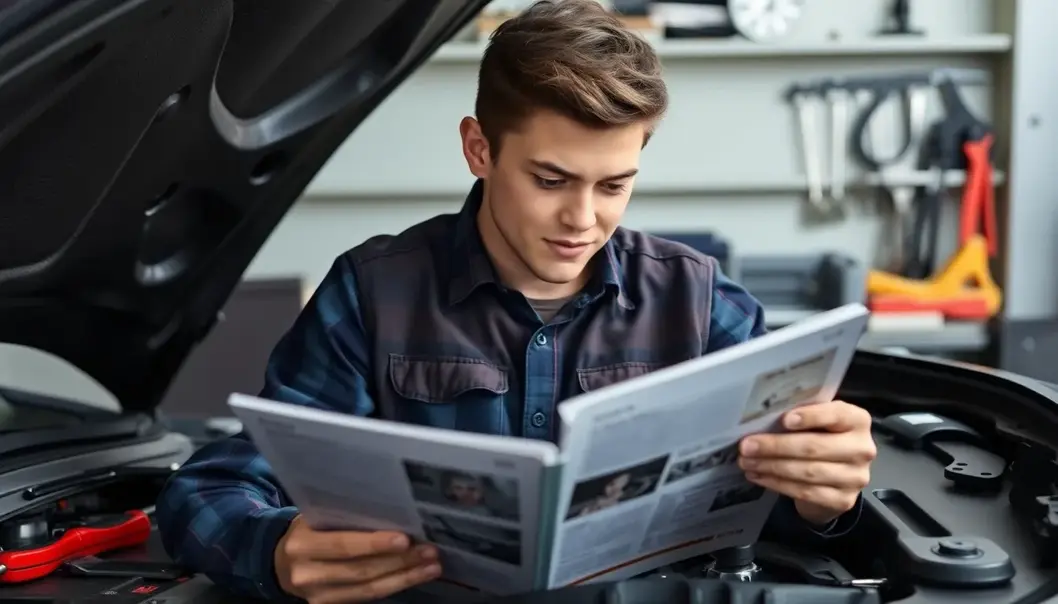Maintaining your car might feel like a daunting task, especially if you’re new to it. However, basic car maintenance is essential to ensure your vehicle runs smoothly and safely. Whether you’re planning a road trip or just want to make sure you aren’t stranded on your morning commute, understanding some key maintenance basics can go a long way. This guide is specially crafted for young adults eager to learn how to keep their cars in top shape without breaking the bank. Dive in to discover essential maintenance habits that will help extend your car’s life and improve its performance.
Understanding Your Car’s Manual: The Maintenance Bible

Owning a car comes with the responsibility of proper maintenance, and while many resources can guide you along the way, nothing beats your car’s manual. This comprehensive guidebook, often overlooked, is tailored specifically for your vehicle. It’s not just a book—it’s a critical resource that can prevent potential headaches and keep your car running smoothly.
The car manual is the most authoritative source when it comes to understanding your vehicle’s needs. While it might seem daunting at first glance, especially with its technical jargon and extensive details, it doesn’t require a background in automotive engineering to comprehend. Taking time to familiarize yourself with its content can save you from unnecessary and costly repairs down the line.
Start with the basics. Each section of the manual covers different aspects of your car’s operation and maintenance. One of the most crucial sections is the maintenance schedule. This is your roadmap to what your vehicle needs and when it needs it. Ignoring this section can lead to premature wear and tear of critical components. Pay attention to the service intervals that dictate when you should change oil, replace filters, or get diagnostic checks.
Beyond the maintenance schedule, the manual provides insights into fluid types and capacities. Using the wrong type of oil or coolant can significantly affect performance and longevity, so make sure you’re adding exactly what your vehicle specifications require. The manual also provides guidance on tire pressure, which is vital for ensuring safety, fuel efficiency, and prolonging tire life.
For those unexpected scenarios, the troubleshooting section can be a lifesaver. Whether it’s a perplexing warning light or an unusual noise, the manual offers a starting point for diagnosing potential issues. This can help you communicate more effectively with a mechanic or even allow you to solve minor problems on your own.
While online resources can supplement your knowledge, always cross-reference them with your manual to ensure accuracy. Online information might not always cater to your specific make and model, whereas your manual is written with only your vehicle in mind. Don’t forget to jot down notes or bookmark essential pages for quick reference.
As you grow more comfortable with your manual, you’ll discover its value not just as a reference tool, but as a foundation for empowered car ownership. Understanding your car’s manual is a skill that pays off throughout your driving life, enabling you to maintain your vehicle effectively and avoid unnecessary stress and expenses.
Basic Maintenance Tasks You Can Do Yourself

You don’t always need to take your car to a mechanic for basic maintenance. There are several simple tasks you can perform yourself that will not only save you money but also give you a better understanding of your vehicle. These tasks are straightforward, requiring minimal tools and no advanced technical skills.
First and foremost, checking your oil is crucial. Your car’s engine depends on oil for lubrication, cooling, and cleaning. Start by parking on a level surface and turning off the engine. Wait a few minutes for the oil to settle, then pop the hood and locate the dipstick. Pull it out, wipe it clean, insert it back fully, and pull it out again. Check the oil level against the marked indicators. If it’s low, add the appropriate type of oil as mentioned in your car manual. Ensuring the oil is at the correct level helps prevent engine wear and overheating.
Another element of your routine should be monitoring tire pressure. Incorrectly inflated tires can lead to poor fuel efficiency, decreased handling, and accelerated tire wear. Invest in a simple tire pressure gauge, available at most automotive stores. Find the manufacturer-recommended tire pressure in your car manual or on a sticker inside the driver’s door. Check the pressure when your tires are cold, and if necessary, inflate them to the recommended levels. Regular checks will result in smoother rides and help avoid costly tire replacements.
Replacing windshield wiper blades is another easy maintenance task. Worn-out blades can obstruct visibility, especially during rain, affecting road safety. Most wiper blades can be replaced in minutes. Lift the wiper arm, press the small tab where the blade meets the arm, and slide the old blade off. Attach the new blade by sliding it into place until it clicks. Always select the right size and type of blade compatible with your car model.
Understanding and undertaking these basic maintenance tasks enhances your vehicle’s performance while fostering confidence. Regular care ensures you’re not surprised by avoidable issues, keeping your car running smoothly and safely. While professional help is invaluable for complex problems, taking charge of simple maintenance is both empowering and beneficial for young adults stepping into car ownership.
Final words
Arming yourself with car maintenance knowledge not only ensures your ride stays in peak condition but also saves money and time in the long run. Start small—understand your car’s manual and tackle basic tasks—then gradually build your expertise. Experience the joy of self-sufficiency and confidence as you take charge of your vehicle’s health.
Ready to master car maintenance? Visit our website for more expert tips and resources!
Learn more: https://example.com/car-maintenance
About us
Our platform provides comprehensive car maintenance resources and expert tips for all vehicle owners, especially young adults looking to maintain their cars efficiently and smartly.

